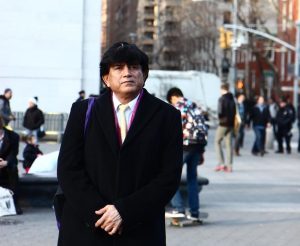Yuyutsu Ram Dass Sharma is a world-renowned Himalayan poet and translator, the recipient of fellowships and grants from the Rockefeller Foundation, the Ireland Literature Exchange, the Trubar Foundation in Slovenia, the Institute for the Translation of Hebrew Literature, and the Foundation for the Production and Translation of Dutch Literature. He has published 10 poetry collections, including The Second Buddha Walk, A Blizzard in my Bones: New York Poems, and Quaking Cantos: Nepal Earthquake Poems. Currently, Yuyutsu Sharma is a visiting poet at Columbia University and edits Pratik: A Quarterly Magazine of Contemporary Writing.
The Diplomat’s Arun Budhathoki sat down with Sharma to talk about poetry and his journey as a poet.
Can you briefly tell us about your journey as a renowned Himalayan poet?
“In the field of poetry you have to make a ‘niche.’ You need your special kind of image.” When I teach at American universities that is what I would say – a poet needs to have their own aura, element, and creative world that becomes public.
When I quit teaching at Tribhuvan University, Kathmandu, two decades ago and became a freelance writer, the first thing I tried to find out was if it was possible to make a living out of my writing. Nepal is a big tourist destination. I wanted to write books that perhaps tourists would purchase. I wrote poems about the Himalayas and published a book, Folk Tales of Sherpa and Yeti. Thus, I started traveling in the Himalayas where I found my element and wrote poems to celebrate the mountains. A few years after, I started traveling abroad. During my travels in Europe, it turned out that I had to tell others who I was and what I did for a living. I told them I was a poet from Nepal. It made a big impact on others. Even in my writing and my performances, I questioned how I ought to introduce myself to others. It began as a simplified measure to introduce myself though my Himalayan poems that people loved and the effort gradually snowballed into this big image of a Himalayan poet. Hence, I didn’t on purpose carve it into my current position.
I decided to write about the Himalayas because if you see South Asian poetry then it’s very political. Most of the poets are writing about their ethnic identities or political troubles. Nepal too has been plagued by this as we have gone through despots and ruthless rulers. Now since democracy has been achieved, the poets should have changed their content. But still the poets here continue with the old vibes. This is why I have carried the Himalayas with me and it is dominant in my writings.





























